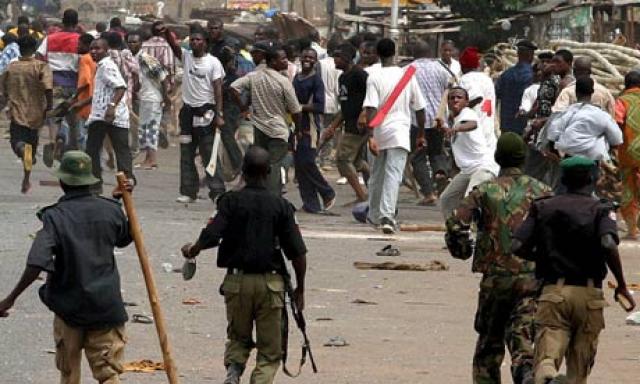More than 549 deaths and displacement of thousands in 12 states in the last 12 months were recorded, Amnesty International stated, accusing the Federal Government of unlawful killings, torture and detention of persons.
Enumerating a litany of mishaps it encapsulated in 15 human rights issues in Nigeria, the London-based Non-Governmental Organisation, in its 2017/2018 annual report also lamented that inter-communal violence linked to lingering clashes between herdsmen and farming communities resulted in
It reported that ”Boko Haram carried out at least 65 attacks causing 411 civilian deaths, and abducted at least 73 people. Sixteen women, including 10 policewomen, were abducted in June when Boko Haram ambushed an army-escorted convoy on the Maiduguri-Damboa road.
”In July, Boko Haram ambushed a team of oil prospectors in a village in Magumeri. Three oil workers were abducted and at least 40 other people were killed, including soldiers and members of the Civilian Joint Task Force. On May 6, 82 Chibok schoolgirls, abducted in 2014, were released by Boko Haram fighters in an exchange deal; 113 girls remained in captivity. In November, six farmers in Dimge village in Mafa were abducted and beheaded.”
Contacted Thursday, the Nigeria Army declined comments on the allegations
Lack of accountability
It decried what it described as government’s lack of accountability on the issues saying: ”In June, the Special Board of Inquiry to investigate allegations of gross violations of human rights, established by the Chief of Army Staff, found that Giwa barracks was extremely overcrowded, with poor sanitation and insufficient ventilation, factors which resulted in detainees’ deaths. It cleared senior military officers, alleged to have committed crimes under international law, of wrongdoing.
Unlawful killings, torture, ill-treatment
According to the report: ”At least 10 IPOB members were killed and 12 others wounded by soldiers in Umuahia, Abia state on September 14. The military claimed that they were killed when they tried to resist the arrest of leader Nnamdi Kanu at his home. Witnesses say that, in addition to those killed, at least 10 IPOB members were shot and taken away by soldiers. The government subsequently banned the IPOB.
”On March 9, a court in Abuja sentenced two police officers to death for their part in the extrajudicial execution of six traders in Apo, Abuja, in 2005. Three other police officers including the leader of the police team were acquitted. In 2005, a Judicial Commission of Inquiry had indicted six police officers for the murders and recommended their trial as well as compensation for the victims’ families. One of them allegedly escaped from custody in 2015.
In September, the High Court in Port Harcourt convicted five SARS policemen for the extrajudicial executions of Michael Akor and Michael Igwe in 2009. The court also awarded N50 million (USD143,000) in compensation to the victims’ families.
In December, after huge pressure on social media, the Inspector General of Police agreed to reform SARS.
”Torture and other ill-treatment and unlawful detention by the police and the State Security Service (SSS) continued. In February, Nonso Diobu and eight other men were arrested and detained by Special Anti-Robbery Squad (SARS) officers in Awkuzu, Anambra state. They were tortured and all, except Nonso Diobu, died in custody. Nonso Diobu was charged with robbery and released four months after arrest.
”In May, a high court ordered the SSS (DSS) to release Bright Chimezie, a member of the Indigenous People of Biafra (IPOB). Instead, the SSS included his name in another case.
Bright Chimezie had not been brought to court by the end of the year; the SSS had held him in incommunicado detention for more than one year.
”Ibrahim El-Zakzaky, leader of the Islamic Movement of Nigeria (IMN), and his wife remained in incommunicado detention without trial since their arrest in December 2015 despite a court ordering their release and compensation.
Arbitrary arrests, detentions
Amnesty International noted that torture and other ill-treatment and unlawful detention by the police and the Department of State Service, DSS, continued in Nigeria.
”The military arbitrarily arrested and held thousands of young men, women and children in detention centres around the country. Detainees were denied access to lawyers and family members. The army released 593 detainees in April and 760 in October.
”By April, the military detention facility at Giwa barracks, Maiduguri, held more than 4,900 people in extremely overcrowded cells. Disease, dehydration and starvation were rife and at least 340 detainees died. At least 200 children, as young as four, were detained in an overcrowded and unhygienic children’s cell. Some children were born in detention.
The military detained hundreds of women unlawfully, without charge, some because they were believed to be related to Boko Haram members. Among them were women and girls who said they had been victims of Boko Haram. Women reported inhuman detention conditions, including a lack of health care for women giving birth in cells.
”On September 24, the Minister of Justice announced that the mass trial of Boko Haram suspects held in different detention centres had commenced. The first phase of trials was handled by four judges in secret, between October 9 and12. Fifty defendants were sentenced to various terms of imprisonment.
An interim report of the Director of Public Prosecutions showed that 468 suspects were discharged and the trial for the remainder was adjourned to January 2018.”
1.7 million internally displaced people
The group said there are no fewer than 1.7 million internally displaced people (IDPs) in North Eastern states of Borno, Yobe and Adamawa; 39 per cent lived in camps or similar settings and 61 per cent in host communities.
”The UN said that 5.2 million people in the northeast remained in urgent need of food assistance; 450,000 children under five were in urgent need of nutrition. In July, Doctors without Borders reported that 240 children had died from malnutrition in Borno State.”

